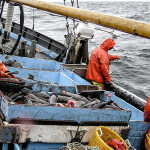One of China's biggest seafood-producing provinces has launched ambitious energy-saving and pollution-control measures.
Northeastern Shandong's Fishery Bureau recently announced it would reduce pollution by 2010 and promote energy saving and zoology fish breeding technology.
The announcement comes after a green algae bloom affected its port city of Qingdao prior to this summer's Olympic sailing events, requiring the efforts of thousands of volunteers to clear it.
According to the bureau, the Ocean Fishery department will hasten the renewal of energy-intensive mechanical fish-processing machinery, replacing more than two thirds of the current total within two years, saving up to 20 percent of the amount of fuel currently used.
Eighty percent of the province's fishing boats will also be replaced, saving up to 10 percent of current fuel costs.
No figures have been released about the cost of the project, which is expected to be paid for by the provincial government to increase output and improve competitiveness.
The province also aims to create 2 million square meters of fish breeding grounds by 2010 using recycled water and liquid oxygen. Water renewal will be reduced to two or three times a week, saving 1.3 billion cubic meters of water and 300 million kilowatt-hours of electricity, compared to 2.25 billion cubic meters of water per year and 500 million kilowatt-hours of electricity per week now.
Shandong province will also implement an ocean pollution control policy by 2010, controlling discharges to within 150 thousand tons.
The province has almost one-sixth of China's coastline at 3,120 kilometers and 150,000 square kilometers of inshore fishing grounds producing $7 billion of seafood last year, almost 19 percent of China's ocean-related gross domestic product.
At the other end of the country, officials are investigating fish deaths in Beihai Bay, Guangxi Dong Autonomous region.
Reports late last week said 50 kilograms of elephant nose whorl had been found together with fish rotting beneath Guantou mountain. The discovery again raised concerns that China's water pollution continues to be serious.
According to the official report from China Ocean Bureau in 2007, one quarter of China's inshore waters are seriously polluted, with 80 percent of the pollution due to industrial wastewater.





